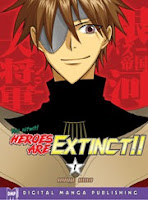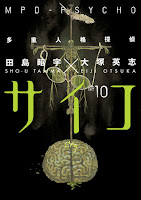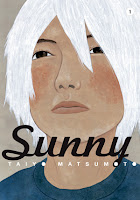My News and Reviews
I recently watched and enjoyed Kids on the Slope which inspired me to learn more about jazz in Japan. To that end, I decided to read one of the very few books on the subject, Jazz Journeys to Japan: The Heart Within by jazz writer and journalist William Minor. It’s part travelogue and part music criticism and history. Personally, I found Minor’s writing style to be annoying, but the information was great. Last week I also posted the most recent Library Love feature, which is now back on its regular bimonthly schedule.
Deb Aoki, the former editor of About.com:Manga, has launched a new website of her own—Manga Comics Manga. She’s already posted some great content, including the list of manga from the Best & Worst Manga panel at the San Diego Comic-Con and the accompanying audio. Last week I mentioned some of the news from SDCC that I was particularly interested in, but Brigid Alverson has a nice roundup of most of the manga news from SDCC at MTV Geek and at A Case Suitable for Treatment Sean Gaffney takes a closer look at the licenses that were announced.
A few more interesting items that I’ve recently come across online: Toh EnJoe was interviewed at SFFWorld. Special attention is given to Self-Reference Engine, which remains one of my favorite books that I’ve read this year. Also, the winners of the Silent Manga Audition competition have been announced and the winning entries have all been made available for download. Later this week, the Boys’ Love Manga Moveable will begin! Khursten of Otaku Champloo will be hosting and has already posted a couple of great giveaways: We want new webcomics! and Name your kinks.
Quick Takes
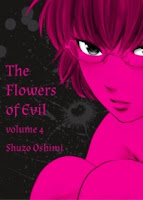 Flowers of Evil, Volumes 4-6 by Shuzo Oshimi. I have no idea where Oshimi is going with Flowers of Evil but the series seems to be getting better and better. Kasuga has changed considerably from who he was at the beginning of the manga. Nakamura has forced him to realize things about himself that he had tried to keep hidden or that he wasn’t aware of to begin with. And then there’s Saeki, who he once idolized but who isn’t the embodiment of purity he thought or wanted her to be. The relationship between the three is a dangerous and twisted triangle of love, power, and submission. Flowers of Evil is intense. It’s dark. It’s perverted. I’m looking forward to the next arc a great deal.
Flowers of Evil, Volumes 4-6 by Shuzo Oshimi. I have no idea where Oshimi is going with Flowers of Evil but the series seems to be getting better and better. Kasuga has changed considerably from who he was at the beginning of the manga. Nakamura has forced him to realize things about himself that he had tried to keep hidden or that he wasn’t aware of to begin with. And then there’s Saeki, who he once idolized but who isn’t the embodiment of purity he thought or wanted her to be. The relationship between the three is a dangerous and twisted triangle of love, power, and submission. Flowers of Evil is intense. It’s dark. It’s perverted. I’m looking forward to the next arc a great deal.
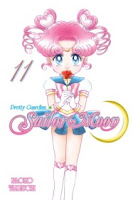 Pretty Guardian Sailor Moon, Volume 11 by Naoko Takeuchi. The eleventh and penultimate volume of Pretty Guardian Sailor Moon is the beginning of the final major story arc in the series. After an all too brief time of peace, the Sailor Guardians once again must face a powerful enemy. And this time the entire galaxy may be at stake. The last volume I read of Pretty Guardian Sailor Moon was actually the fourth one, but I was still able to fall into the story of the eleventh fairly easily. I love how Takeuchi plays around with gender roles and expectations in Pretty Guardian Sailor Moon. The series continues to be frantically paced and occasionally difficult to follow, but its mix of silliness and seriousness is charming. I can understand why the manga is so well loved.
Pretty Guardian Sailor Moon, Volume 11 by Naoko Takeuchi. The eleventh and penultimate volume of Pretty Guardian Sailor Moon is the beginning of the final major story arc in the series. After an all too brief time of peace, the Sailor Guardians once again must face a powerful enemy. And this time the entire galaxy may be at stake. The last volume I read of Pretty Guardian Sailor Moon was actually the fourth one, but I was still able to fall into the story of the eleventh fairly easily. I love how Takeuchi plays around with gender roles and expectations in Pretty Guardian Sailor Moon. The series continues to be frantically paced and occasionally difficult to follow, but its mix of silliness and seriousness is charming. I can understand why the manga is so well loved.
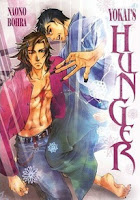 Yokai’s Hunger by Bohra Naono. I really wanted to like Yokai’s Hunger, and there were parts of it that I did enjoy, but for the most part the manga frustrated me. In particular, the legends and mythologies in this boys’ love one-shot were a complete mess. Koma is described as a tengu, but he’s depicted as a dog spirit rather than the usual avian-inspired yokai. Later the manga tries to merge Mesopotamian myths with the story; it doesn’t end up working very well. I didn’t realize when I first picked up Yokai’s Hunger that it was largely a comedy. The humorous moments in the manga are certainly much more successful than those attempting to be more serious. Yokai’s Hunger was actually quite funny in places.
Yokai’s Hunger by Bohra Naono. I really wanted to like Yokai’s Hunger, and there were parts of it that I did enjoy, but for the most part the manga frustrated me. In particular, the legends and mythologies in this boys’ love one-shot were a complete mess. Koma is described as a tengu, but he’s depicted as a dog spirit rather than the usual avian-inspired yokai. Later the manga tries to merge Mesopotamian myths with the story; it doesn’t end up working very well. I didn’t realize when I first picked up Yokai’s Hunger that it was largely a comedy. The humorous moments in the manga are certainly much more successful than those attempting to be more serious. Yokai’s Hunger was actually quite funny in places.
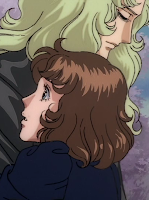 Dear Brother, Episodes 21-39 directed by Osamu Dezaki. The second half of the Dear Brother anime adaptation picks up the pace from the first and I found myself consistently engaged. There is so much drama in the Dear Brother and it’s marvelous (even when it’s not particularly believable.) The story unfolds within the social dynamics of Seiran Academy and within the personal lives of the students. What happens at the academy pales in comparison to the tragedies outside of it. Some of the plot twists seem to come out of nowhere and some of the revelations are shocking, but it makes for an absorbing tale. The very last scene is a bit of a cop-out, but otherwise I found the ending of the series to be satisfying. I really enjoyed Dear Brother.
Dear Brother, Episodes 21-39 directed by Osamu Dezaki. The second half of the Dear Brother anime adaptation picks up the pace from the first and I found myself consistently engaged. There is so much drama in the Dear Brother and it’s marvelous (even when it’s not particularly believable.) The story unfolds within the social dynamics of Seiran Academy and within the personal lives of the students. What happens at the academy pales in comparison to the tragedies outside of it. Some of the plot twists seem to come out of nowhere and some of the revelations are shocking, but it makes for an absorbing tale. The very last scene is a bit of a cop-out, but otherwise I found the ending of the series to be satisfying. I really enjoyed Dear Brother.

